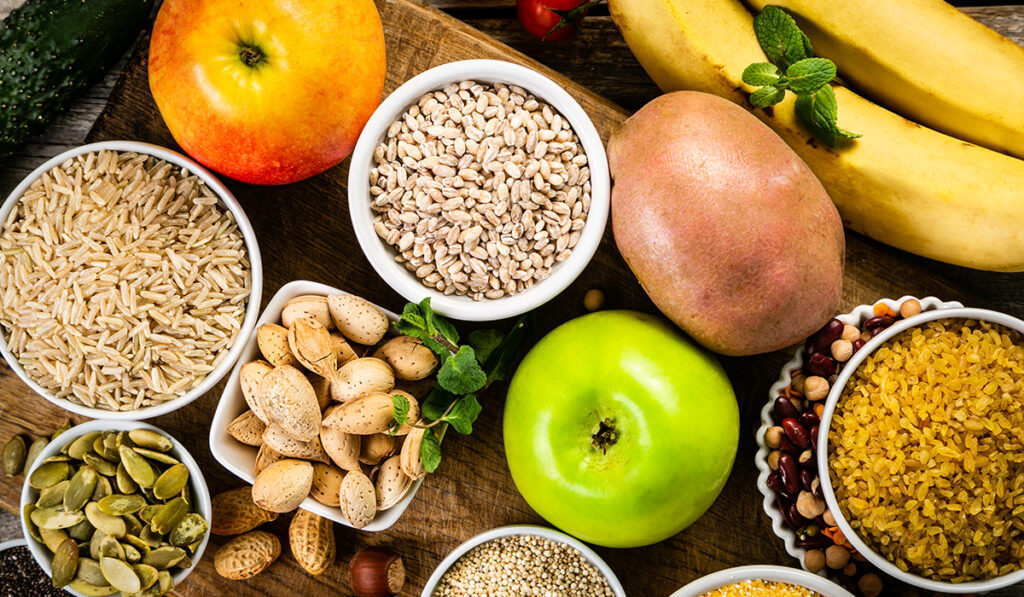The prevalence of obesity and the decline in food quality are on the rise in America. It is estimated that approximately 42% of American adults have a body mass index (BMI) classified as obese. As obesity rates increase, so does the consumption of processed foods and the loss of soil nutrients. These factors significantly affect food quality and can directly influence both short- and long-term health, as well as the risk of obesity. Read on to discover the top five ways food quality impacts your obesity risk.
1. Palatability
Processed foods are intentionally crafted to be highly palatable, making them more appealing to our senses. These foods often contain concentrated ingredients like high fructose corn syrup (HFCS) for sweetness and refined salt or monosodium glutamate (MSG) for savoriness. Companies meticulously balance the ratios of salt, sugar, and fat to stimulate the brain’s reward centers, making these foods harder to resist.

This can lead to overconsumption and increased caloric intake, which over time may contribute to obesity. Additionally, ingredients like HFCS and MSG have been linked to insulin and leptin resistance—two hormones that play crucial roles in fat oxidation and the body’s ability to burn fat for energy—further increasing the risk of obesity.
2. Refined Carbohydrates
Processed foods often lack nutrient quality and are high in refined carbohydrates and fructose sugar. Refined carbohydrates are those from which natural vitamins and minerals have been removed. These foods include: wheat, flour, rice, and sugar. These ingredients are commonly found in white breads, pastas, pastries, crackers, cereals, candies, and sodas. Research shows that refined carbohydrates can increase the risk of obesity by elevating caloric intake and causing spikes in blood sugar and insulin levels. Observational studies consistently indicate that populations with high consumption of refined carbohydrates—especially from sugary snacks and beverages—experience higher obesity rates.

Many of these foods, such as candies, cereals, and sodas, often contain high fructose corn syrup (HFCS), an artificial sweetener linked to obesity through its role in promoting inflammation and insulin resistance. Animal studies have demonstrated that rats fed a diet rich in HFCS exhibit obesity-related characteristics, such as increased abdominal fat and elevated triglycerides.
The type of carbohydrates consumed significantly influences obesity risk. At Metabolic Meals, we take pride in using vegetable sources and low-allergenic sources for carbohydrates in our meals and sauces and ensuring they contain no high fructose corn syrup.
3. Fiber and Protein Content
Food quality is significantly influenced by its fiber and protein content. Generally, lower-quality foods are also lower in both fiber and protein. Fiber, a crucial component of plant-based foods, enhances satiety, nourishes beneficial gut bacteria, and supports healthy digestive function. These factors play a vital role in reducing overeating and promoting metabolic and hormonal functions that affect obesity risk.

Increased fiber intake is linked to lower body weight and a decreased likelihood of developing obesity-related conditions. Furthermore, a higher fiber consumption improves blood sugar control, which helps stabilize energy levels throughout the day, thereby reducing fluctuations in hunger hormones that can lead to overeating.
Protein is another essential component that aids in enhancing satiety, regulating blood sugar and insulin levels, and promoting lean muscle mass. This, in turn, helps manage energy intake and prevents insulin resistance, which can heighten the risk of obesity. High-quality protein sources include eggs, meat, fish, poultry, and legumes. Opting for grass-fed proteins is advisable due to their superior fatty acid and antioxidant profiles. At Metabolic Meals, we exclusively use grass-fed proteins to provide you with the highest quality options in every meal.

4. Fat Sourcing
The quality of the foods you eat significantly impacts your fatty acid profile, as fats can be either pro-inflammatory or anti-inflammatory. The key lies in the types of fats you choose. There are four main categories of fats: monounsaturated, polyunsaturated, saturated, and trans fats.

Among polyunsaturated fats, you’ll find omega-3 and omega-6 fatty acids. Omega-3 fatty acids are known for their anti-inflammatory properties, while omega-6 fatty acids can promote inflammation. Monounsaturated fats and omega-3 polyunsaturated fats are rich in antioxidants and contain anti-inflammatory compounds, whereas trans fats are associated with pro-inflammatory effects.
Inflammation plays a significant role in the risk of obesity. Research suggests that consuming trans fats may lead to weight gain and obesity by increasing visceral body fat. Common sources of trans fats include margarine, fried foods, store-bought baked goods, packaged snacks like popcorn, and frozen meals such as TV dinners.

At Metabolic Meals, we prioritize your health by never using oils that contain omega-6 fatty acids or trans fats. Instead, we ensure that each meal is abundant in monounsaturated fats and omega-3s by incorporating olive oil, coconut oil and grass-fed proteins.
5. Vitamins and Mineral Content
The quality of food is significantly influenced by its vitamin and mineral content. Processed foods are often refined, stripping them of their natural vitamins and minerals. In contrast, whole, unprocessed foods offer a diverse array of essential nutrients that support vital processes such as metabolism, hormone production, detoxification, and cellular function. These processes directly impact how your body burns and stores the food you consume. Without sufficient vitamins and minerals for these critical functions, the risk of obesity increases.

To Recap
The quality of the food you consume directly impacts essential processes such as metabolism, inflammation, and appetite regulation. Each of these factors contributes to the risk of obesity and its related complications. At Metabolic Meals, we are committed to using only the highest quality ingredients and ensuring that it is convenient for you to support your health every day.

Order your high-quality healthy meals today.
About the Author
Lauren Papanos is a licensed registered dietitian nutritionist and nutrition researcher, published in the Journal of Women’s Sports Medicine. She holds her bachelor’s and master’s degrees in nutrition sciences, board certification in sports nutrition as well as advanced certifications in functional medicine and functional endocrinology. She is the owner of the private practice, Functional Fueling Nutrition where they specialize in working with active women and athletes with thyroid diseases and endocrine and metabolic conditions. Lauren has been featured on national television and in Forbes, Shape and Insider. She is the host of the Strength in Hormones Podcast. You can find Lauren on Instagram at functional.fueling and learn more about her practice at www.functionalfueling.com.






